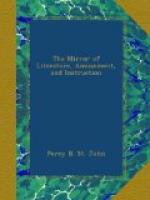“Oh, yes,” said he, very dryly, “I have one more.”
“What may that be?”
“That I WILL marry her.”
“Oh!...” said I.
And without exchanging another word, I put on my great coat, and we sallied forth together to the rendezvous of the lovers. The fair fugitive was true to her appointment, and at the first sound of the expected footfall, glided from her concealment into the happy scoundrel’s arms. The action which followed I could not see (though it was a bright moonlight,) for a breeze lifted the large veil which hung over the lady’s shoulder, in such a manner as to envelope the countenances of both. What the action ought to have been, perhaps you, madam, or you, mademoiselle, may inform me?—I only know that when the modest zephyr passed, and the veil fell back again, the fair cheek that it revealed glowed with
“A pudency so rosy, the sweet view
on’t,
Might well have warm’d old
Saturn.”
Harry gave me his hand (heartily) as he stood on the carriage step, and the bride wafted me a farewell with the prettiest action of her fan from the window, and murmured,—“Give me a good wish for the tobacconist.”
“Yes,” said I; “may you never have occasion to say of the love that now leads you to him, that
“‘Its beacon light is quench’d in smoke.’”
[For although naturally grave, and silently given, I often catch myself endeavouring to sport a bad pun, when I have got the ear of a fair damsel] The only effect which the witticism produced in the present instance, however, was an enormous groan, in which the fellows on the dickey participated. Even the postilion who stood near, set up a crowing laugh—and the very horses by their snorting and neighing, seemed to be sensible of the utter and deplorable failure.
And away they went—and they were hotly pursued, and overtaken, just in time to be too late—which left no other course but that of reconciliation;—and where there is no choice to be made, every body knows there is but one part to be taken.




